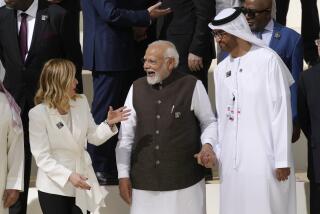Japan Reports Reduction in Greenhouse Gas Emissions
- Share via
TOKYO — Two years after the Kyoto accord on global warming, most of the major industrial powers and developing countries are emitting more greenhouse gases than ever.
Still, U.S. and Japanese officials say there has been incremental progress on diplomatic and technological fronts toward convincing many countries that it is possible and essential to cut carbon dioxide emissions by 2010 to below levels a decade ago--the goal set in Kyoto.
Environmentalists remain skeptical about whether developing countries will make sacrifices for the environment while Americans, who generate a quarter of greenhouse gases--which contribute to global warming--refuse to slap tougher efficiency standards on their ever-larger sport-utility vehicles.
The U.S. should lead the way by slashing domestic emissions, but “there are still well-funded, powerful efforts to block any action,” said Dan Becker, director of the global warming and energy program in Washington for the Sierra Club.
In Japan, however, carbon dioxide emissions dropped by 3.8% in 1998. Although about 60% of that is believed to be due to the country’s economic slump, some was the result of efficiency improvements, according to Japan’s Environment Agency.
Japan will keep its promise to reduce greenhouse gas emissions to 6% below 1990 levels in 10 years, said Hironori Hamanaka, director-general of the agency’s global environment department. But it will meet that goal only if measures agreed to in Kyoto, including giving developed countries credit for emission improvements they make in developing countries, are implemented.
Meanwhile, Japan has made progress in negotiations with China, which remains staunchly opposed to setting targets for reducing its soaring emissions until it achieves a higher standard of living, Hamanaka said.
Japan is concerned not only about China’s escalating production of greenhouse gases but also about its sulfur-laden emissions that increase damage here from acid rain. So Japan is seeking deals on joint public and private projects in China to improve energy efficiency, slash emissions and make sure new Japanese investment is “green.”
Among the projects: a $170-million proposal by Hitachi Corp. to retrofit four Chinese coal-burning power plants to boost efficiency and cut emissions by 21%.
But it’s not all smooth sailing. Nichimen Corp. wants to build a factory to produce cleaner-burning bio-briquettes, made of coal dust and fiber, to replace low-quality coal that is burned untreated. That would reduce carbon dioxide and sulfur dioxide emissions. But after two years of negotiations, the Chinese have delayed the $34-million project in favor of a water-pollution amelioration effort, according to Nichimen spokesman Takashi Ochi.
Nevertheless, Chinese officials are showing increasing interest in green projects, particularly those that come with development aid. They also are discussing such deals with the U.S., the European Union and others, Hamanaka and U.S. officials acknowledged.
Other countries--and some U.S. corporations--that were skeptical or scornful during the December 1997 Kyoto conference no longer dispute the scientific evidence that greenhouse gases are heating up the planet, insisted Ambassador Mark G. Hambley, the U.S. special negotiator on climate change.
Hambley was in Tokyo this month for a meeting of the “Umbrella Group”--the U.S., Japan, Canada, Australia, New Zealand, Ukraine and Norway--that helps nations comply with the Kyoto pact. He said the group is narrowing its differences with two others dealing with climate change: the European Union and a bloc of 77 developing countries that includes China.
The richer nations are more confident about meeting targets set in Kyoto, while poorer countries are realizing that “clean development” could help them, Hambley said.
The hope is to reach agreement on some of the thorniest issues at the sixth global warming conference in The Hague in November.
The Clinton administration will not submit a global warming treaty to the Senate for ratification until it is sure that the cost of implementing the treaty does not hinder U.S. economic growth and that the final treaty provides for “meaningful participation by key developing countries,” Hambley said.
However, “meaningful participation” has yet to be defined.
More to Read
Sign up for Essential California
The most important California stories and recommendations in your inbox every morning.
You may occasionally receive promotional content from the Los Angeles Times.













